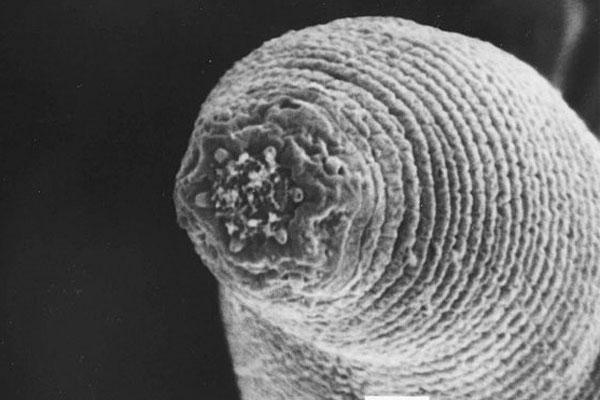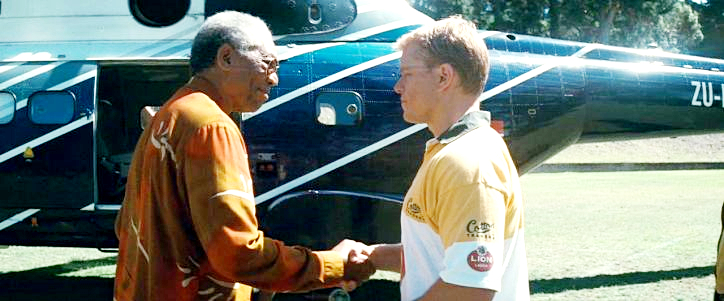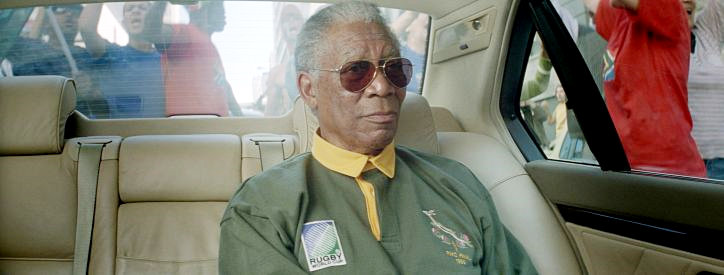
An Unconquerable Soul.

Haunting the Web Since 1999


From a few weeks ago and languishing in the bookmarks, scientists find nematodes a mile below the Earth’s surface, raising the possibility of similar life on other worlds. The spice must flow… “The two lead researchers…said the discovery of creatures so far below ground, with nervous, digestive and reproductive systems, was akin to finding ‘Moby Dick in Lake Ontario.‘”

Don’t get me wrong — The movie has its heart in the right place, and I wholeheartedly agree with many of its basic contentions. I too believe Nelson Mandela is a great man, and that he was just the right man to lead his nation at the delicate hour when apartheid finally fell. I believe that racism is a moral failing that must be overcome, and that forgiveness is a more enlightened path than revenge. (As A.O. Scott aptly pointed out in his more-positive review of this film, Invictus is as committed to examining the issue of vengeance, and its overcoming, as Unforgiven, Gran Torino, Mystic River, and countless other films in Eastwood’s oeuvre.)
And I even think there’s a sophisticated story to be told here about the role of symbols (the Springboks), iconography (green-and-gold), and sports teams in politics and nation-building. (Throughout much of Invictus, I was reminded of a book from gradual school days: In the Midst of Perpetual Fetes, historian David Waldstreicher’s book on the early national period of the United States, when (as the title indicates) our Founders threw galas, parties, and festivities pretty much constantly to help engender a healthy nationalism in newly-minted Americans.)
Both in terms of fostering forgiveness on both sides and as a sheer political play, the basic “human calculation” made here by President Mandela — getting behind a team loathed by blacks and beloved by whites in order to signal good-faith intentions to Afrikaners and to help forge a new national unity — is a very savvy one. (You might even say it’s a Lincolnesque move, and in fact, there’s a good bit of Lincoln’s blend of folk wisdom, bonhomie, and ruthless, clear-eyed political calculation in Mandela as portrayed here.) And, of course, there’s a great underdog sports tale at the actual Cup itself — South Africa versus the mighty All Blacks of New Zealand.
The point being, Eastwood had a lot of good raw material to work with here in Invictus…but the final product, alas, is not so good. The film is competently-made, sure, and everyone from Morgan Freeman (not just being himself) to Matt Damon (great job with the accent) on down does a solid job with what they’re given. But the movie still ends up being more Flags of our Fathers than Letters from Iwo Jima: It’s so ham-fisted so often that it hardly ever gets off the ground. And it just doesn’t trust that the audience will pick up on anything unless it’s spelled out for them and underlined a few times. (I presume this is Eastwood’s fault rather than the source material, John Carlin’s Playing the Enemy — One definitely gets the sense from Invictus that Clint may have watched Idiocracy recently.)
One example should explain the problem. In one scene in the middle going, the all-white Springboks (Chester Williams notwithstanding) venture to a run-down shantytown in Soweto to teach young black South Africans the sport of rugby. (In this case, Invictus is smart to spell one thing out to the audience — the basic rules of play.) The kids generally seem excited by the trip, some of the Afrikaner meatheads who were complaining before start smiling and getting into it, and everybody — white and black — is clearly having a good time. The basic point is obvious from the entire scene: The fun of the game and the day is bringing former adversaries together. But then Clint has to pan over to a sign saying something like “One Team One Nation” or somesuch, and right thereafter some not-very-good pop song blares over the soundtrack with hokey lines like “we are color blind.” Ok, Clint, we get it.
Invictus does this throughout its run. Just in case we somehow miss the racial-reconciliation-through-sport point of the entire movie, there are multiply-redundant systems built into the narrative. There’s a divided Greek chorus of security guards that, like the Springboks, gradually come together as a team. There’s the black maid of Matt Damon’s somewhat haughty white family, who finally gets included as an equal. And there are even cuts to some random once-racist white cops and the black youths they would’ve undoubtedly spent the day harrassing, if it weren’t for the healing benediction of rugby, all jumping up and down together and enjoying the Big Win. After awhile, it all gets to be overkill.
Put simply, Invictus has great and laudable intentions, and I guess I wouldn’t call it an out-and-out fumble. But it definitely should’ve taken some lessons in subtlety from the real Nelson Mandela: Sometimes a quiet word in the right moment speaks louder than the mightiest of trumpets.

“Although this is not yet confirmed, FIFA is expected to use a tried and tested formula for its finals draw for South Africa 2010. The system couples FIFA rankings with performances in the past two finals tournaments to create a group of eight seeds that also includes the hosts.”
With fans of Ireland still smarting after Thierry Henry’s egregious “Main de Dieu” handball last month, ESPN reviews the crop of futbol teams facing off in World Cup 2010. Here’s hoping the unseeded France ends up in this year’s Group of Death…and USA doesn’t!
As with the other day, I can’t seem to make Quicktime happy at my workstation here. Nonetheless, it appears Matt Damon has gone from exposing his conjoined twin’s involvement in the WMD fiasco to ending apartheid in the new trailer for Clint Eastwood’s Invictus, with Morgan Freeman as Nelson Mandela. Busy fella.
Also in today’s trailer bin, two second looks at worlds gone mad: Mia Wasikowska finds Through the Looking Glass is still crazy after all these years in trailer #2 for Tim Burton’s Alice in Wonderland, also with Johnny Depp, Helena Bonham Carter, Anne Hathaway, Stephen Fry, Michael Sheen, Crispin Glover, Timothy Spall, and Christopher Lee. To be honest, it looks a little too Burton-y to me, if such a thing is possible for a property like Alice.
And Leonardo di Caprio is still losing his cool on The Island in trailer #2 for Martin Scorsese’s recently kicked-to-2010 Shutter Island, also featuring Ben Kingsley, Mark Ruffalo, Michelle Williams, Patricia Clarkson, Elias Koteas, Jackie Earle Haley, and the eminent Max Von Sydow. Eh, this looks better than most January fare.

Here, the aliens in question — having arrived in a stalled ship under horrifying refugee conditions and been deemed “Prawns” by the disgusted human population — are festering in a slum outside Johannesburg, where they are mostly starving, causing trouble, indulging drug addictions (in their case, cat food), and/or getting exploited by the local (Nigerian) criminal element. Our protagonist in this tale — after you see him at work, you wouldn’t really call him “our hero” — is one Wikus van der Merwe (newcomer Sharlto Copley), a eager-to-please bureaucrat for Multi-National United (MNU), who on account of family connections is tasked with supervising the relocation of District 9 to what amounts to a tented concentration camp, farther away from humankind. (Wikus’ other appointed task: to acquire for the Halliburton-like MNU as much alien-tech as possible for the multinational’s very profitable weapons division.)
But there’s more to District 9 than just a socially-conscious apartheid fable (and describing it as follows will give away some mild spoilers.) The head of the film, its first forty minutes or so, feels like a Paul Greengrass movie such as Bloody Sunday: a grim, gripping tale of social and political injustice (and, as per the Bournes, powerful and sinister multinationals) told in naturalistic, faux-documentary style. But the thorax of District 9 delves deeper into old-school David Cronenberg territory, with all the gooey orifices, transformational anxiety, and throbbing gristle that usually portends. (There’s a touch of Blomkamp’s mentor, the Dead Alive-era Peter Jackson, here as well — particularly in those ruthless energy weapons.) And, by the time we get to the abdomen, we’re suddenly watching a George Miller or Jim Cameron-style actioner, with more than enough visceral excitement to keep the antennae twitching.
All stitched together, District 9 is quite a remarkable feat of summer sensation. In the end, I’m pretty sure I enjoyed the more self-contained experiences of Moon and The Hurt Locker more. And I might quibble here and there with Blomkamp’s execution — the lapses back to documentary-style talking heads at times feels like cheap and easy exposition, and cute kid plot-devices are cute kid plot-devices no matter the species involved. But, unlike Terminator: Salvation and (I presume) its Hasbro-minded competition this summer, Blomkamp’s District 9 actually manages to deftly recombine familiar sci-fi elements into something that feels new and original. In short, it’s the clever, gory, mildly thought-provoking, and indisputably kick-ass action thrill-ride genre fans have been waiting for all season.

In a special Africa-themed edition of the movie bin, a young Scottish doctor (former faun James McAvoy) hangs with Ugandan dictator Idi Amin (Forrest Whitaker) and Gillian Anderson in the new trailer for The Last King of Scotland, potentially crooked cop Nic Vos (Tim Robbins) spurs Patrick Chamusso (Derek Luke) to rally against South African apartheid in the trailer for Phillip Noyce’s Catch a Fire (which continues the director’s move from Patriot Games-type thrillers to global-political fare such as Rabbit-Proof Fence and The Quiet American), and things go awry in Morocco for Brad Pitt and Cate Blanchett (and elsewhere for Gael Garcia Bernal and Clifton Collins Jr.) in this look at Alejandro Gonzalez Inarritu’s Babel. (Let’s hope it’s better than Inarritu’s woeful 21 Grams.)
The WP takes a gander at the Southern African Large Telescope (SALT), which “can see 13 billion years back in time, nearly to the big bang. With its 10-by-11-foot hexagonal mirror — the largest of its type in the world — SALT concentrates the faintest, most distant light in the universe. If a candle were to flicker on the moon, SALT could detect it.“